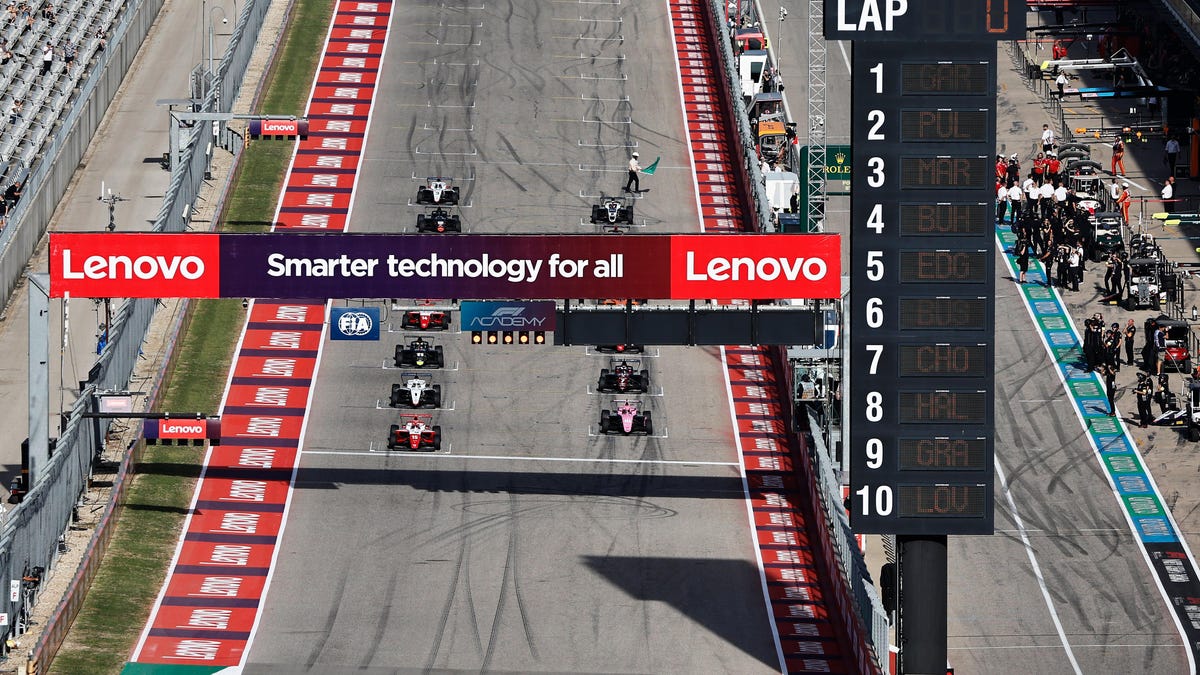The presence of women in motorsport is still a rarity, but new series like F1 Academy are designed to help bridge the gap and lift young women from the grassroots to an international open-wheel series — and at Circuit of the Americas during the United States Grand Prix, I got to witness firsthand just how important that kind of representation can be.
I’m of the opinion that the journalists who spend the whole race weekend in the media center are missing out on what motorsport actually is. It can be easy to remain in the very insular world of the F1 paddock, reporting on esoteric rumors, minor technical upgrades, and lap times, but you’ll be totally out of touch with the mood of the fans and the general trajectory of the sport — and for me, those big-picture trends are woefully ignored.
So, Saturday morning, I arrived at Circuit of the Americas bright and early with the rest of the hyper-dedicated fans who wanted to catch every moment of racing action. I toured around the Masters Historic Racing paddock, then grabbed an iced coffee and sat at a picnic table in Lonestar Land, a nickname for a tucked-away fan zone inside the track. I watched fans, families, and track workers go through their early morning paces — and then F1 Academy hit the track.
The all-female F1 Academy is the replacement for the now-defunct W Series, and its intention is to provide girls and young women with the opportunity to compete in an open-wheel car while also making crucial connections in the F1 paddock and displaying their skills on a grand stage.
I know all of those things, of course, but I’ve never actually seen the impact. I haven’t seen an F1 Academy race in person, and I haven’t had an opportunity to speak to many folks about their views on it. But early that Saturday morning, F1 Academy hit the track for its first of two races during the U.S. Grand Prix weekend — and young girls seemingly appeared out of nowhere.
A family at a table next to me was sharing some barbecue for breakfast; the dad was decked out in McLaren gear, but the mom and kids were just dressed comfortably for a warm day at the track. As the F1 Academy driver intros began to play on a large screen near the tables, I watched the young girl at the table light up. She pointed at the screen and yelled, “Mom! Mom, there are girls in this series! There are girls racing!”
Farther away, on the walking path into Lonestar Land, a different girl ran well ahead of her family in order to get a close-up view of the screen. She watched the start of the race on the screen before it occurred to her to rush over to the fence that sectioned off the track. As I watched her go, I realized there was a smattering of other girls and women peering over the fence. The younger ones sat on shoulders or hopped up and down to catch a glimpse of a car streaking through Turn 17; older ones clutched the fence and stood on the tips of their toes, peering at the action.
The crowd near that fence was light, yes, but it was dominated by women. Two teens wearing Queen t-shirts and complaining about the noise perked up, hesitant to show interest but still keeping an eye on the screen as the race progressed. An older woman pulled her husband closer to the screen and scolded him when he complained; he could wait to buy a snack, the race was only a few laps. A man shepherding a formidable flock of children of all genders jogged up to the fence, waving the kiddos forward, telling them, “Look, y’all! This series is entirely made of girls! And some of them are only a little older than you!”
Maybe I was feeling particularly sentimental that morning, but I’ll admit it: I teared up. I know what it’s like to watch racing and fail to see yourself represented. I know what it’s like to grow up with a brother who was told he could be a race car driver if he wanted, while I could aspire to be a race car driver’s wife.
But I also know what it’s like to realize you actually can do that thing that you’ve never seen a person like you do. It took me until my late teens to realize that women can be involved in the motorsport industry, and that they can make incredible journalists, and I stumbled into that world by accident; it was an epiphany to realize I could make an entire career of writing about race cars — and when I did, I realized how badly I wanted to see more women in various positions in the racing world.
I still have reservations about F1 Academy (though many of those reservations have faded as the sport has continued to evolve throughout its first season), but there’s one thing I’m not reserved about: Young girls at Circuit of the Americas got to watch a woman win a championship. They got to see a whole field of women race. They got to see themselves in a role that perhaps they’d never considered before. And it was beautiful.

